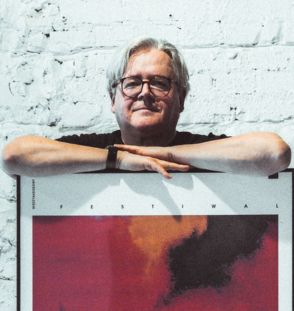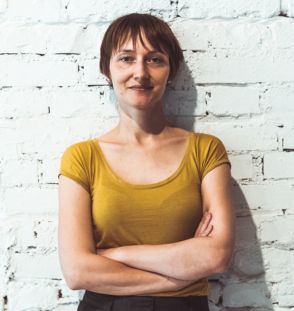Geographies of Imagination
Haiti, Singapore, Congo, Belarus or Turkey – these are just a few of the countries referred to by the artists invited to this year’s Malta. Scattered around the world, those geographical locations gain identity in gestures, movements, beliefs and culture of their inhabitants. The inhabitants’ imagination gives meaning to the geography, but imagination is also dependent on geographic and cultural determinants. The local character of imagination, its fluidity, temporariness, movement will be the subject of this year’s Malta. How does this local character transform itself and how do artists transform it? We do not put labels of exotic otherness on the selected projects as has been the case for so long in Europe towards that what is distant. Quite the contrary, we are interested in showing the local in the world of global art transfers, not only the voluntary ones, but also those caused by war or economic conditions.


This line of thinking was inspired by the work of Orhan Pamuk, a Turkish novelist and 2006 Nobel Prize winner. His novel, My Name is Red, is the basis for the opera I, Şeküre commissioned for the festival this year. The opera was created by Aleksander Nowak, one of the most interesting Polish composers of the middle generation. The libretto and excerpts from the music will be presented during Malta Festival Poznań 2023. The event will be accompanied by a meeting with Orhan Pamuk.
All of Orhan Pamuk’s works revolve around the clash of the Western and Eastern culture. In My Name is Red, this clash is in the field of aesthetics, specifically, in thinking about the painting. Clashing the Ottoman tradition of miniature paining and the Renaissance art from Venice reflecting reality, the writer created the image of Turkey torn between Asia and Europe. At the same time, he asks more far-reaching questions about the interrelations between the local and global, peripheral and central, movement and stability. He brings into the discussion the subject of culture flows, the circulation of ideas, mentality and practice which are key notions for the invited performance artists.
The Divine Cypher, by Ana Pi, an Afro-Brazilian artist, is the outcome of the artist’s study of the Haitian voodoo heritage and its place in the contemporary Haitian imagination, that is Haitian contemporary urban dancing. Yishun Is Burning by Choy Ka Fai is another performance based on a research project which took many years to complete. The artist of Singapore and German origin, has for years analysed various forms of Asian shamanism. In both performances a documentary-like description of the rituals meets with the artists’ imagination, showing how tradition is used in contemporary dance forms. Patrick Ziza’s performance Dandyism offers another take on that referring to the phenomenon of dandyism in Congo. It shows the abundance and originality of Congo imagination, which took the style of European gentlemen and used it in its own ways and for its own purposes. On the other hand, Igor Shugaleev, a Belarussian performing in Sergey Shabohin’s Ich heiße Frau Troffea, talks about his experience of looking for freedom, which he found in the movement of bodies in Berlin rave parties. Persecuted by Lukashenko’s regime, Igor Shugaleev had to flee Belarus in 2020.
All of those artists, show how thanks to body, movement and image, imagination captures and expresses old practices in new forms, how dance becomes a freeing experience, how that what’s distant moves closer in art. At the same time, looking at stories and experiences which not so long ago were outside the sphere of interests of European theatres and festivals, they prove that a Europe-centric perspective on reality is limited. Bringing stories and experiences from outside of Europe into the European mainstream is part of decolonization practices and reflects the social and cultural context of contemporary Europe. It also keeps the European culture moving.
It does not mean that the European multiculturalism does not have its problems. Only in Pamuk’s works, his characters, on the one hand, advocate European rationalism, progress and modernity, on the other, in emotional terms cannot step outside their world and freeze in an inert being. Multiculturalism is a real challenge for contemporary Europe and we will discuss this isseue during the Forum, a series of debates and meetings with authors which has been organized for many years now. How to keep the balance between the clashing cultural forces, how to become more modern without losing one’s own identity? We will look at some examples from Turkey – its paradoxical secularization, relations with Europe, as well as the place of Islam in Europe and the interrelations between the notions of centre and periphery in contemporary culture.
Let us not forget, however, that art not only offers us a critical outlook on reality, but also creates an area in which one can counterbalance sadness and fear by celebrating together. The Festival will open with a street parade which will bring together people of different cultures, generations and experiences. The youngest festival goers are invited to the performances by Teatr Czerwona Walizka and Teatr Mozaika which will take place in the public space.
The Festival Centre with concerts and silent disco, Forum discussions, workshops for children as well as open meetings and informal discussions on the festival events, will also be available to the festival audience. This year, the Festival Centre will be located in the seat of Malta Foundation on 44 Ratajczaka Street, in the very heart of the city in the historic building of Arkadia. The huge open space with a terrace overlooking Wolności Square and showing the city panorama will be designed by Olga Strizhniova. The Festival Centre will hold the concerts (of Aktaş Erdoğan & Erol Leenhouts among others) as well as some creative activities prepared by children as part of the programme Wolno Dzieciom, curated by Maja Brzozowska and Elżbieta Niewiadomska-Wieczorek, celebrating its 10th anniversary this year. All events held in the Festival Centre will be free of charge.
The music finale of this year’s Malta will be a concert of Baasch, one of the most original electro artists in Poland. This event will be organised in cooperation with Grupa Stonewall and will be the finale of the Pride Week in Poznań.
We hope that this year’s programme opens up one’s perspective to experience the realities which are unknown, even though they sometimes exist next to us. Such a festival becomes the place of subjectification and decolonization practices, remaining open and inviting.


